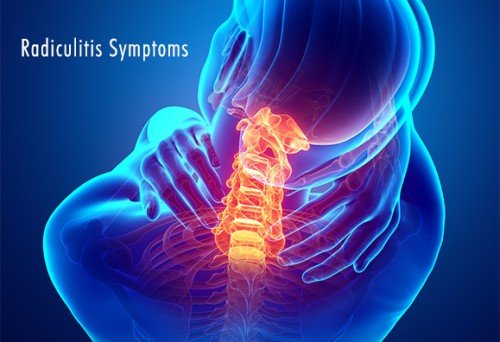
Radiculitis, also known as radicular pain or radiculopathy, is a condition that affects the nerves that emerge from the spinal cord and travel to the rest of the body. This condition is caused by compression, inflammation, or injury to the nerve roots, which can result in pain, numbness, tingling, or weakness in various parts of the body.
Symptoms of radiculitis can vary depending on which nerve roots are affected. If the nerve roots in the neck (cervical spine) are affected, the symptoms may include pain, numbness, and weakness in the arms and hands. If the nerve roots in the lower back (lumbar spine) are affected, the symptoms may include pain, numbness, and weakness in the legs and feet.
The most common cause of radiculitis is a herniated disc, which occurs when the cushioning discs between the vertebrae in the spine become damaged and the gel-like material inside them leaks out and presses on the nerve roots. Other causes include spinal stenosis (narrowing of the spinal canal), degenerative disc disease, osteoarthritis, and spinal tumors.
Diagnosis of radiculitis typically involves a physical examination, imaging tests such as X-rays, CT scans, or MRI scans, and nerve conduction studies to measure the speed at which nerves transmit signals. Treatment options vary depending on the severity of the symptoms and the underlying cause of the condition.
Conservative treatments such as rest, physical therapy, and pain medication may be recommended initially. In some cases, steroid injections may be used to reduce inflammation and relieve pain. Surgery may be recommended if conservative treatments are not effective, or if there is significant nerve damage.
The symptoms of radiculitis can vary depending on which nerve roots are affected. Common symptoms may include:
-
Pain: Radiculitis can cause sharp or shooting pain that radiates from the back, neck, or buttock down to the legs or arms. The pain may be constant or intermittent, and may worsen with certain movements or activities.
-
Numbness or tingling: Radiculitis can cause a sensation of numbness or tingling in the affected area. This may be accompanied by a feeling of pins and needles or a burning sensation.
-
Weakness: Radiculitis can cause weakness in the affected area, making it difficult to perform certain tasks or activities.
-
Loss of reflexes: In severe cases, radiculitis can cause a loss of reflexes in the affected area.
-
Difficulty walking or standing: If the lower back nerve roots are affected, it can be difficult to walk or stand for extended periods of time.
It is important to note that symptoms may vary from person to person and may depend on the underlying cause of the condition. If you are experiencing any of these symptoms, it is important to speak with your healthcare provider to determine the cause and appropriate treatment.
Prevention of radiculitis involves maintaining good spinal health through exercise, maintaining a healthy weight, practicing good posture, and avoiding activities that put excessive stress on the spine.
The treatment for radiculitis depends on the underlying cause and severity of the symptoms. The goal of treatment is to relieve pain, reduce inflammation, and improve nerve function.
-
Conservative treatments: Conservative treatments may include rest, physical therapy, and pain medication. Physical therapy can help to strengthen the muscles around the affected area, improve flexibility, and reduce pressure on the nerve roots. Pain medication such as nonsteroidal anti-inflammatory drugs (NSAIDs) or muscle relaxants may also be prescribed to relieve pain and reduce inflammation.
-
Steroid injections: Steroid injections may be used to reduce inflammation and relieve pain. This involves injecting a corticosteroid medication directly into the affected area.
-
Surgery: Surgery may be recommended if conservative treatments are not effective, or if there is significant nerve damage. Surgery may involve removing the herniated disc or other structures that are putting pressure on the nerve roots.
-
Alternative treatments: Alternative treatments such as acupuncture or chiropractic care may also be used to relieve pain and improve nerve function. However, it is important to speak with your healthcare provider before starting any alternative treatments.
It is also important to take steps to prevent future episodes of radiculitis. This may involve maintaining good spinal health through exercise, maintaining a healthy weight, practicing good posture, and avoiding activities that put excessive stress on the spine.
If you are experiencing symptoms of radiculitis, it is important to speak with your healthcare provider to determine the cause and appropriate treatment.
In conclusion, radiculitis is a condition that affects the nerves emerging from the spinal cord and can cause pain, numbness, and weakness in various parts of the body. It is typically caused by compression, inflammation, or injury to the nerve roots and can be treated through a combination of conservative treatments and, in some cases, surgery. Maintaining good spinal health through exercise and good posture is key to preventing radiculitis.








